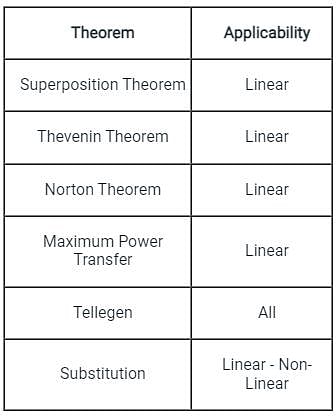Electrical Engineering (EE) Exam > Electrical Engineering (EE) Questions > Tellegen’s theorem is based on the prin...
Start Learning for Free
Tellegen’s theorem is based on the principle of law of __________.
- a)Conservation of charge
- b)Conservation of mass
- c)Conservation of velocity
- d)Conservation of energy
Correct answer is option 'D'. Can you explain this answer?
| FREE This question is part of | Download PDF Attempt this Test |
Most Upvoted Answer
Tellegen’s theorem is based on the principle of law of _________...
Tellegen’s Theorem:
According to Tellegen’s theorem, the summation of instantaneous powers for the n number of branches in an electrical network is zero.
Let n number of branches in an electrical network have I1, I2, I3, ….. In respective instantaneous currents through them.
These branches have instantaneous voltages across them are V1, V2, V3, ….. Vn respectively.
According to Tellegen’s theorem,

It is based on the conservation of energy.
Let n number of branches in an electrical network have I1, I2, I3, ….. In respective instantaneous currents through them.
These branches have instantaneous voltages across them are V1, V2, V3, ….. Vn respectively.
According to Tellegen’s theorem,

It is based on the conservation of energy.
Important Points
Various Theorem and the circuits where they are applicable is shown below in the table:

Various Theorem and the circuits where they are applicable is shown below in the table:

Attention Electrical Engineering (EE) Students!
To make sure you are not studying endlessly, EduRev has designed Electrical Engineering (EE) study material, with Structured Courses, Videos, & Test Series. Plus get personalized analysis, doubt solving and improvement plans to achieve a great score in Electrical Engineering (EE).

|
Explore Courses for Electrical Engineering (EE) exam
|

|
Similar Electrical Engineering (EE) Doubts
Tellegen’s theorem is based on the principle of law of __________.a)Conservation of chargeb)Conservation of massc)Conservation of velocityd)Conservation of energyCorrect answer is option 'D'. Can you explain this answer?
Question Description
Tellegen’s theorem is based on the principle of law of __________.a)Conservation of chargeb)Conservation of massc)Conservation of velocityd)Conservation of energyCorrect answer is option 'D'. Can you explain this answer? for Electrical Engineering (EE) 2024 is part of Electrical Engineering (EE) preparation. The Question and answers have been prepared according to the Electrical Engineering (EE) exam syllabus. Information about Tellegen’s theorem is based on the principle of law of __________.a)Conservation of chargeb)Conservation of massc)Conservation of velocityd)Conservation of energyCorrect answer is option 'D'. Can you explain this answer? covers all topics & solutions for Electrical Engineering (EE) 2024 Exam. Find important definitions, questions, meanings, examples, exercises and tests below for Tellegen’s theorem is based on the principle of law of __________.a)Conservation of chargeb)Conservation of massc)Conservation of velocityd)Conservation of energyCorrect answer is option 'D'. Can you explain this answer?.
Tellegen’s theorem is based on the principle of law of __________.a)Conservation of chargeb)Conservation of massc)Conservation of velocityd)Conservation of energyCorrect answer is option 'D'. Can you explain this answer? for Electrical Engineering (EE) 2024 is part of Electrical Engineering (EE) preparation. The Question and answers have been prepared according to the Electrical Engineering (EE) exam syllabus. Information about Tellegen’s theorem is based on the principle of law of __________.a)Conservation of chargeb)Conservation of massc)Conservation of velocityd)Conservation of energyCorrect answer is option 'D'. Can you explain this answer? covers all topics & solutions for Electrical Engineering (EE) 2024 Exam. Find important definitions, questions, meanings, examples, exercises and tests below for Tellegen’s theorem is based on the principle of law of __________.a)Conservation of chargeb)Conservation of massc)Conservation of velocityd)Conservation of energyCorrect answer is option 'D'. Can you explain this answer?.
Solutions for Tellegen’s theorem is based on the principle of law of __________.a)Conservation of chargeb)Conservation of massc)Conservation of velocityd)Conservation of energyCorrect answer is option 'D'. Can you explain this answer? in English & in Hindi are available as part of our courses for Electrical Engineering (EE).
Download more important topics, notes, lectures and mock test series for Electrical Engineering (EE) Exam by signing up for free.
Here you can find the meaning of Tellegen’s theorem is based on the principle of law of __________.a)Conservation of chargeb)Conservation of massc)Conservation of velocityd)Conservation of energyCorrect answer is option 'D'. Can you explain this answer? defined & explained in the simplest way possible. Besides giving the explanation of
Tellegen’s theorem is based on the principle of law of __________.a)Conservation of chargeb)Conservation of massc)Conservation of velocityd)Conservation of energyCorrect answer is option 'D'. Can you explain this answer?, a detailed solution for Tellegen’s theorem is based on the principle of law of __________.a)Conservation of chargeb)Conservation of massc)Conservation of velocityd)Conservation of energyCorrect answer is option 'D'. Can you explain this answer? has been provided alongside types of Tellegen’s theorem is based on the principle of law of __________.a)Conservation of chargeb)Conservation of massc)Conservation of velocityd)Conservation of energyCorrect answer is option 'D'. Can you explain this answer? theory, EduRev gives you an
ample number of questions to practice Tellegen’s theorem is based on the principle of law of __________.a)Conservation of chargeb)Conservation of massc)Conservation of velocityd)Conservation of energyCorrect answer is option 'D'. Can you explain this answer? tests, examples and also practice Electrical Engineering (EE) tests.

|
Explore Courses for Electrical Engineering (EE) exam
|

|
Suggested Free Tests
Signup for Free!
Signup to see your scores go up within 7 days! Learn & Practice with 1000+ FREE Notes, Videos & Tests.
























